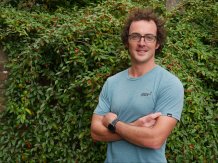Articles

Dr Tim Dodwell is one of only five new Turing AI Fellows across the country.
Exeter expert receives prestigious Turing AI Fellowship
A leading applied mathematician at the University of Exeter has been awarded a prestigious AI Fellowship from UK Research and Innovation, it has been announced.
Dr Tim Dodwell, a Senior Lecturer in Industrial Applied Mathematics, is one of only five new Turing AI Fellows across the country.
The Fellowship, which runs for five years and is worth £1.3 million of government investment. Dr Dodwell, supported by matched investment from university partners and industry, will conduct pioneering research into building a more sustainable aviation industry.
For his Fellowship, Dr Dodwell will develop new AI methods which combine high-performance mathematical simulations with traditional experimental data, to help engineers determine the safety of new planes.
The new methods will not only allow the aerospace industry to build faster, lighter, more sustainable aircraft for the future, but provide new applications across the high-value manufacturing sector and broader scientific communities.
Speaking about the Fellowship, Dr Dodwell said: “It is a real honour to be awarded such a prestigious fellowship to lead an ambitious, interdisciplinary research programme in data centric engineering. It is going to be a very exciting and dynamic time here in Exeter’s newly formed Institute of Data Science and AI.”
The AI Fellowships were created to attract and retain the best research talent from around the world.
The Office for Artificial Intelligence, The Alan Turing Institute and UK Research and Innovation (UKRI) worked together to design this call, and it is anticipated that further AI Fellowship opportunities will be announced in November.
Dr Dodwell, alongside the other four new Fellows, are drawn from a wide variety of disciplines and backgrounds and will be tackling research challenges, including AI for discovery in data intensive astrophysics.
The Alan Turing Institute was created as the national institute for data science in 2015, adding AI to its scope in 2017. Exeter joined the Institute earlier in 2018, recognised for its research excellence and its ability to bring new expertise and proposals which work in line with their core values.
Science Minister Chris Skidmore said: “AI has the potential to boost productivity and enhance every industry across the economy, from developing new treatments for life-threatening diseases to tackling climate change. Today’s announcement is helping us solve the UK’s Grand Challenges by ensuring the UK is at the forefront of the latest technologies and opening-up British businesses to new opportunities.
“The UK is a petri-dish for incredible talent and we’re passionate about nurturing the next generation of world-class scientists, so the UK remains at the forefront of research and innovation.
“That is why we’re investing in the AI and bioscience PhD research. These critical areas will transform the UK economy and create the highly-skilled workforce we need for the future.”
Digital Minister Matt Warman said: “The UK has a long-standing reputation for innovation. We are the birthplace of artificial intelligence and home to technology pioneers such as Alan Turing and Ada Lovelace. We are determined to see this continue.
“Today we are announcing a bumper investment in skills training to strengthen our workforce and attract, nurture and retain the best talent so we can lead the world in research and development.
“AI is already being used to improve lives by helping detect fraud quicker and diagnose diseases more accurately. With the brightest minds at the helm we will be able to explore this cutting-edge technology further."
Adrian Smith, Institute Director and Chief Executive of The Alan Turing Institute, said: “We look forward to what this talented group of Turing AI Fellows will bring to our vibrant research community and we welcome their contributions to our growing Institute.
"There is vast potential for their diverse work to be transformative in both the foundations and applications of AI and I am confident they will push the boundaries of what these new technologies can do for the good of society.”
Date: 24 October 2019
